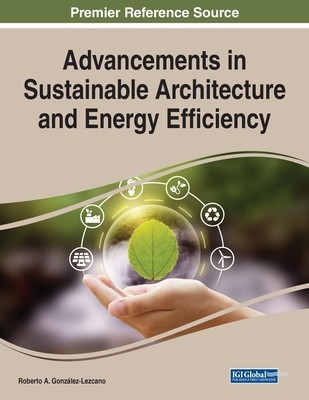
- We will send in 10–14 business days.
- Publisher: Engineering Science Reference
- Year: 2021
- ISBN-10: 1799870243
- ISBN-13: 9781799870241
- Format: 21.6 x 27.9 x 1.9 cm, minkšti viršeliai
- Language: English
- SAVE -10% with code: EXTRA
Advancements in Sustainable Architecture and Energy Efficiency (e-book) (used book) | bookbook.eu
Reviews
Description
Thermal comfort and indoor air quality (IAQ) issues have gained significant interest in the scientific and technical community involved in building performance analysis and other related subjects. In terms of thermal comfort, the achievement and maintenance of a thermally acceptable indoor environment is affected by energy costs, and energy poverty is a widespread problem globally. There is a call for energy-efficient architecture for a developed and sustainable world. However, with the use of renewable energy that increased considerably in recent years, new technical challenges arose for the energy sector. Consumers are key players in this context, as flexibility in demand is crucial to cope with the intermittent nature of most renewable energy sources. Active demand-side participation is particularly important to ensure the efficient use of locally and globally available energy. Sustainability, human comfort, and healthy living environments have become top priorities. Advancements in Sustainable Architecture and Energy Efficiency explores how housing is a key health factor for individuals and looks at factors such as air quality, ventilation, hygrothermal comfort, lighting, physical environment, building efficiency, and other areas as important pieces in healthy architecture. It discusses how the poor application of these parameters can directly affect human health and how sustainable architecture provides a solution. Beyond just labeling the important facets of architecture for healthy living, this book will look at different perspectives of energy consumption and demand to ensure sustainable energy, increased energy efficiency, improved energy policies, and reasonable energy costs for homes. This book is ideal for architects, designers, engineers, energy engineers, environmental scientists, practitioners, researchers, academicians, and students interested in architecture that is both conducive to healthy living and energy efficiency.
EXTRA 10 % discount with code: EXTRA
The promotion ends in 21d.06:17:03
The discount code is valid when purchasing from 10 €. Discounts do not stack.
- Publisher: Engineering Science Reference
- Year: 2021
- ISBN-10: 1799870243
- ISBN-13: 9781799870241
- Format: 21.6 x 27.9 x 1.9 cm, minkšti viršeliai
- Language: English English
Thermal comfort and indoor air quality (IAQ) issues have gained significant interest in the scientific and technical community involved in building performance analysis and other related subjects. In terms of thermal comfort, the achievement and maintenance of a thermally acceptable indoor environment is affected by energy costs, and energy poverty is a widespread problem globally. There is a call for energy-efficient architecture for a developed and sustainable world. However, with the use of renewable energy that increased considerably in recent years, new technical challenges arose for the energy sector. Consumers are key players in this context, as flexibility in demand is crucial to cope with the intermittent nature of most renewable energy sources. Active demand-side participation is particularly important to ensure the efficient use of locally and globally available energy. Sustainability, human comfort, and healthy living environments have become top priorities. Advancements in Sustainable Architecture and Energy Efficiency explores how housing is a key health factor for individuals and looks at factors such as air quality, ventilation, hygrothermal comfort, lighting, physical environment, building efficiency, and other areas as important pieces in healthy architecture. It discusses how the poor application of these parameters can directly affect human health and how sustainable architecture provides a solution. Beyond just labeling the important facets of architecture for healthy living, this book will look at different perspectives of energy consumption and demand to ensure sustainable energy, increased energy efficiency, improved energy policies, and reasonable energy costs for homes. This book is ideal for architects, designers, engineers, energy engineers, environmental scientists, practitioners, researchers, academicians, and students interested in architecture that is both conducive to healthy living and energy efficiency.


Reviews